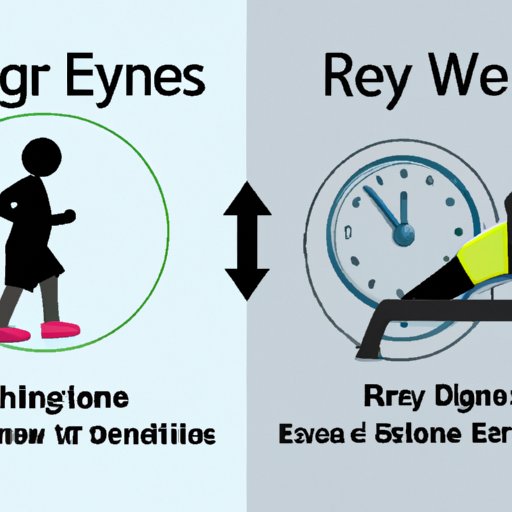Introduction
Losing weight can be a daunting task, as there are many factors that influence the amount of time it takes to see results. Many people have misconceptions about how long it will take to start losing weight, which can lead to discouragement or even give up on the journey altogether. This article will explore the different aspects of weight loss and how long it takes to start seeing results.

Calculating the Calories Needed to Lose Weight and How Long it Takes
The first step in determining how long it will take to start losing weight is to calculate the number of calories needed to lose weight. This can be done by using an online calculator to estimate your daily calorie needs. Based on this calculation, you can then set realistic goals for yourself. For example, if you need 2,000 calories per day to maintain your current weight, reducing your intake by 500 calories per day should result in a 1-pound weight loss per week.
Once you’ve determined your calorie needs, you can then estimate the timeframe for seeing results. Generally speaking, it takes 3,500 calories to equal one pound of fat, so if you’re creating a 500-calorie deficit each day, it should take seven days to lose one pound. However, it’s important to note that everyone’s body is different and the rate of weight loss may vary from person to person.

Understanding the Importance of Exercise for Weight Loss and its Timeframe
Exercise is an important component of any successful weight loss plan. Not only does it help to burn calories, but it also helps to build muscle and keep your metabolism running at its peak. According to a study conducted by the American College of Sports Medicine, aerobic exercise such as walking, jogging, swimming, cycling, and dancing can help to burn calories more quickly than other forms of exercise. Additionally, strength training can help to build lean muscle mass, which can increase your metabolism and help you burn calories even when you’re not exercising.
When it comes to exercise, it’s important to set realistic goals and understand that it may take some time before you start to see results. Depending on your current fitness level and the intensity of your workouts, you may start to see results within two to four weeks. However, it’s important to remember that everyone’s body is different and the rate of progress may vary from person to person.

Analyzing Different Diets and Their Timelines for Weight Loss
When it comes to weight loss, diet plays a major role. There are many popular diets out there, from low-carb to vegan to paleo, and each one has its own pros and cons. When choosing a diet, it’s important to evaluate the diet and determine what works best for you and your lifestyle. Additionally, it’s important to create a meal plan that is balanced and includes all the essential nutrients your body needs to stay healthy.
When it comes to the timeline for seeing results, it depends on the type of diet you choose and how closely you follow it. Generally speaking, most diets will start to show results within two to four weeks. However, it’s important to remember that everyone’s body is different and the rate of progress may vary from person to person.
Examining the Impact of Stress on Weight Loss and How Long it Takes to See Results
Stress is another factor that can affect the timeline for weight loss. Studies have shown that stress can cause hormonal imbalances that can lead to weight gain. Additionally, stress can cause cravings for unhealthy foods, which can sabotage any weight loss efforts.
In order to reduce stress-related weight gain, it’s important to find ways to manage stress. This can include activities such as yoga, meditation, deep breathing exercises, and spending time outdoors. While it may take some time to see results, these activities can help to reduce stress levels and make it easier to stick to a healthy diet and exercise routine.
Exploring the Role of Genetics in Weight Loss and Its Timeline
Genetics play an important role in weight loss and can influence the speed of weight loss. According to a study published in the journal Nature Genetics, certain genetic variations can make it harder to lose weight, even when following a healthy diet and exercise plan. Additionally, certain genetic variations can also make it easier to gain weight, even when eating a balanced diet.
When it comes to genetics and weight loss, it’s important to understand that everyone’s body is different and the rate of progress may vary. Generally speaking, it may take longer to see results if you have certain genetic variations that make it harder to lose weight. However, with patience and dedication, it is still possible to achieve your weight loss goals.
Discovering Lifestyle Changes That Accelerate Weight Loss and How Long They Take
Making lifestyle changes can also help to accelerate the weight loss process. This includes developing healthy eating habits, such as eating more fruits and vegetables, avoiding processed foods, and limiting your intake of sugar and saturated fats. Additionally, it’s important to stay hydrated and get enough sleep each night, as both can help to boost your metabolism and energy levels.
When it comes to the timeline for seeing results, it depends on the types of lifestyle changes you make and how closely you follow them. Generally speaking, you should start to see results within two to four weeks. However, it’s important to remember that everyone’s body is different and the rate of progress may vary from person to person.
Conclusion
Overall, there are many factors that can influence the timeline for weight loss, including diet, exercise, stress, genetics, and lifestyle. It’s important to remember that everyone’s body is different and the rate of progress may vary from person to person. With patience and dedication, however, it is still possible to achieve your weight loss goals.
By calculating your calorie needs, setting realistic goals, understanding the importance of exercise, evaluating different diets, managing stress, understanding the role of genetics, and making lifestyle changes, you can start to see results within two to four weeks. With the right approach and mindset, you can reach your weight loss goals in no time!
(Note: Is this article not meeting your expectations? Do you have knowledge or insights to share? Unlock new opportunities and expand your reach by joining our authors team. Click Registration to join us and share your expertise with our readers.)
